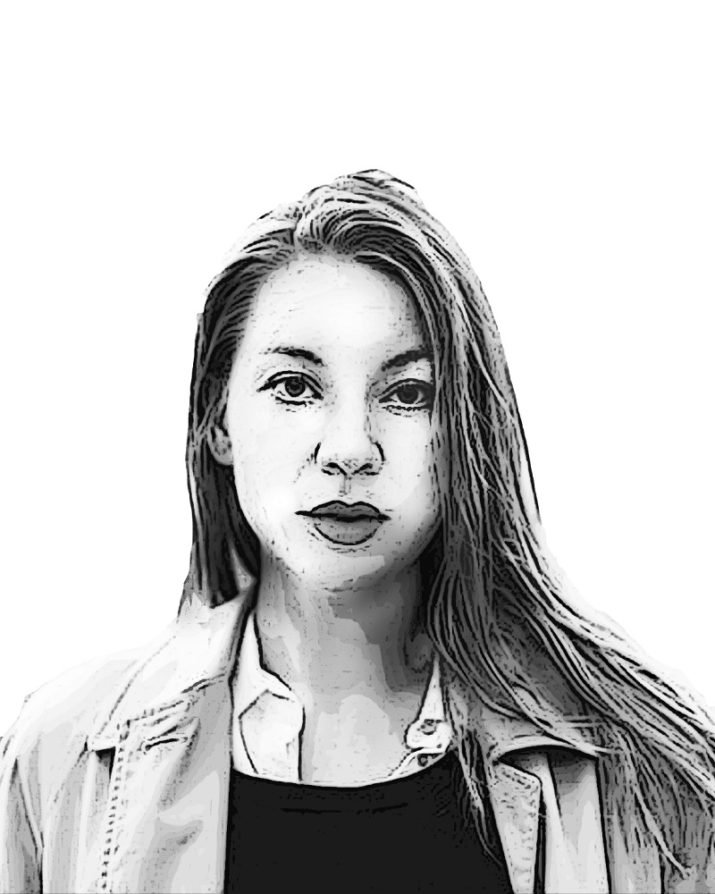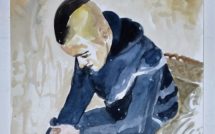

Translated from the Swedish by Saskia Vogel.
On the slope leading to the water, the snow was thick and undisturbed but for the tracks of small birds. The shrub maples close to the house were still blanketed in white. In front of the terrace doors, the snow was melting. Frozen leaves and pine needles that had fallen the year before could be seen through the shallow drifts. She should have cleared all of it away long before the weather turned; and she would have, had she been able to.
Where the deck was bare, the wooden planks were dappled with white droppings from jackdaws that had flown over the house in the fall. At the foot of the large alder lay black twigs and pinecones, and spotlights peeked out from the white like field mice. They no longer lit up the tree at night.
She used to think the spotlights were cameras trained on her, surveilling her every move at home. Of course, now she knew she’d been paranoid, but back then, when the house was at the center of the action, the thought had seemed completely normal.
Now the house was like any other, more or less, and she didn’t take care of it as she used to. No one took care of it. The surfaces—that polished luster she’d once adored—were caked in dust and dirt. Grease spots were simply abandoned. A pattern of coffee cup rings was spreading across the kitchen island. Dust had collected on the floor, and the large windows were covered in smears that looked like a chalk drawing. Layer upon layer of sticky handprints coated the glass at the bottom.
It had been over six months now.
The growing child was a constant reminder.
The passage of time reminded her of everything she’d wanted, her dreams of their life together.
She should have taken her things and the kid and moved away long ago, but she hadn’t been able to bring herself to leave. The house was a part of him and as long as she was within its walls it was as if nothing had happened. Here she could still feel his presence. Sometimes she caught his lanky, broad-shouldered figure out of the corner of her eye as she moved through the rooms.
But each time she left the house, it was all too clear. There was nothing out there. Whenever she approached the front door it was as though she were in a deep valley, making her way through a ravine, impossible to scale, without any idea of what lay ahead.
Therese had moved in right after it had happened. She’d stayed with her and Dream until Alex decided it was enough already and picked her up. He threw her things into his large car, dragged her out of the house, and made her go home. But she had still come back. Either she or Anna had, one or both of them.
They would visit almost every day.
They cleaned and took care of things, they brought food she couldn’t eat and films she couldn’t bear to watch and went for walks with the stroller so she could get some sleep.
And then it came to an end.
They didn’t call her and she didn’t call them either. At the time, it had mostly felt like a relief.
They drifted apart and the idea that they were supposed to be a family—an even more tolerant family than the one she was born into—dissolved more quickly than she had expected. It happened so fast she hadn’t had time to process it. Anna and Therese said that she had abandoned them. But they’d probably never cared about her in the first place and had been friends with her only because of John. Because he’d had the last say about everything and everyone in their little world, and because being near him felt like basking in the sun.
Everyone wanted to get close to him.
When he disappeared, she’d thought their circle had been broken, but now she knew better. She was the only one who had ended up on the outside, alone. The others carried on as usual, just without them. They were two stones that had fallen out of a wall and the wall had sealed itself up again.
The humiliation of having been abandoned by the group and the sorrow that had arrived in John’s absence drove her deeper into isolation. With the newborn permanently attached to her body, she was ushered into a world of crying and night waking and clear, runny discharge seeping out of her, forcing her to wear thick pads.
She looked at the low ceiling of snow clouds gathering over the lake and cliffs and the black forest on the other side. She looked for tears in the cloud cover, for rays of light shining through, precipitation, anything. As if the sky beyond the clouds was supposed to come to grips with her situation and signal that it was time.
Time to come out of hibernation.
She heard shuffling, turned around, and saw Dream on the floor, wriggling across the parquet as she’d just learned to do. Pushing off with her elbows, legs dragging behind, gaze fixed in the near distance, and drool dangling from her mouth.
Each time she saw her commando-crawl like a soldier in basic training, she tried not to think about how he would have laughed, about his laughter and what his face would look like while he was laughing.
She was the only witness.
Dream waggled along without looking up and seemed to think she could keep on going right up the metal leg of the tall stool. She lifted her off the ground and when she had her standing on her lap, Dream looked into her eyes and laughed.
Something white was in her mouth. She stuck her finger in and felt around.
A freshly cut tooth. There it was, like a tack in the wet softness.
New things always arrived without warning, and then they were a given, as if it had never been any different. A laugh, a look, a faltering step. Dream’s many facial expressions were a language unto themselves. The noises she made with her mouth from one day to the next.
It was impossible to imagine her growing up—that her tiny mouth would be used for everything she’d used her own mouth for. Saying all the words she’d already said and many more that were as yet inconceivable.
*
Her fatigue was bright and jagged. It rained down on her, dispersing her thoughts until they were but white noise. She had no idea how long she’d slept last night.
Her eyes were dry, itching and burning. A shiver overtook her.
Dream played with the slim white cable, and she sat slumped over the kitchen island, either reading the mommy magazine or staring out the window. She was reading the only piece she hadn’t read yet: an interview with a TV host about her struggle with postpartum depression. As she read, she smoked a cigarette and her mind became pleasantly empty.
Time passed in this way for a while. Dream sat on the floor with the cable; dropped it; looked at it with suspicion, as if she couldn’t figure out what it was doing in her hand in the first place; and then scooted off. When she reached the sofa, she managed to pull herself to her feet and take a few steps back and forth along the coffee table with both hands on the top. And then she let go, laughing as she plopped to the ground, butt first. She got up and did it again and again, until she set her sights on the charger and crawled back to it.
Her somewhat oversize behind was perfect for this game—a sturdy seat for the little body sitting on the floor. Her back was straight. Her legs were outstretched and open, and once again the cable was dancing between them in time with her moving hand.
When she checked the clock on her phone, an hour had passed. She got out of the chair and picked up the child.
The wind had quieted.
Beyond the window, everything was still but for a seabird cleaving the sky as it dived toward the lake. She stood there holding Dream, the child’s hand on her arm, and tracked the bird. Then she put her on the sofa and unknotted her robe, took hold of her breasts and weighed them in her hands to see which was heavier. She lay down and gently rearranged Dream, stuffing the robe under the baby’s body, moving her soft alabaster arm out of the way. With a jerk, she scooched to one side so her breast was right in front of the baby’s face.
The maneuver was exhausting.
Dream opened her eyes, wrinkled her nose, and opened her mouth wide. She looked like a young predator, shaking her head and hurling herself at the breast, stretching her lips like a suction cup and latching on.
It didn’t hurt, but she was overwhelmed by the memory of how the first few times had felt—like someone rooting around inside her with an iron pipe. The pain spreading like chaos. He had lain beside her and wiped the tears away with his rough fingers, comforting her and repeating what the nurse had said: the first time you breast-feed, the uterus contracts to protect itself, and it’s supposed to hurt. That was nature’s way.
And she’d thought that surely he’d known worse pain.
*
He’d been the one who’d wanted to have kids. He had whispered his wishes in her ear. Suggesting a new direction for them, an opportunity. Word after word, long descriptions of how he loved her and what it would be like to have another one of her, who was also one of him.
For him, the idea of a child was a window opening; for her it was one closing. She thought of all the women she’d seen stand before their men, holding out their children and pleading for them to change their ways. She could see herself worrying even more and thought of the family rooms in prisons: the toys you brought, the stacks of coarse, gray paper napkins.
The paper plates.
But after a while, a response to his desire came from deep inside her. As if something in her suddenly understood and also wanted it. Hot, yearning to be touched by his words.
She’d immediately buried the feeling of having been convinced to do this. But now that he wasn’t around anymore and she didn’t need to keep her feelings about him in check, this particular one had wormed its way to the surface.
Now that he was gone, she could admit to feelings other than the fear of losing him in one of the many ways she’d been warned of. She used to have other thoughts about him too—fantasies about how things would change, the freedom she’d know if he weren’t around.
Now he was gone, but she hadn’t found freedom. He’d left her without letting go. A new version of him had latched onto her body.
Karolina Ramqvist is one of the most influential feminists and writers of her generation in Sweden.She has published several novels, short stories, essays, and criticism, and has contributed widely to a range of leading political and literary journals, and she is the former Editor-in-Chief of Arena magazine. She lives in Stockholm with her husband and children.
Saskia Vogel is a writer and literary translator from Los Angeles. She has written on the themes of gender, power, and sexuality for publications such as Granta, The White Review, The Offing, and The Quietus. Her translations include work by leading Swedish female authors, such as Katrine Marçal, Karolina Ramqvist, and the modernist eroticist Rut Hillarp. Previously, she worked in London as Granta magazine’s global publicist, and in Los Angeles as an editor at the AVN Media Network, where she reported on the business of pornography and adult pleasure products. She holds degrees in film, comparative literature, and writing from Brunel University, the University of Southern California, and University College London.
This excerpt from The White City is published by permission of Grove Atlantic. Translation copyright © 2017 Saskia Vogel.
Photo: Karolina Ramqvist, Private
Photo: Saskia Vogel, Private
Published on February 1, 2017.




